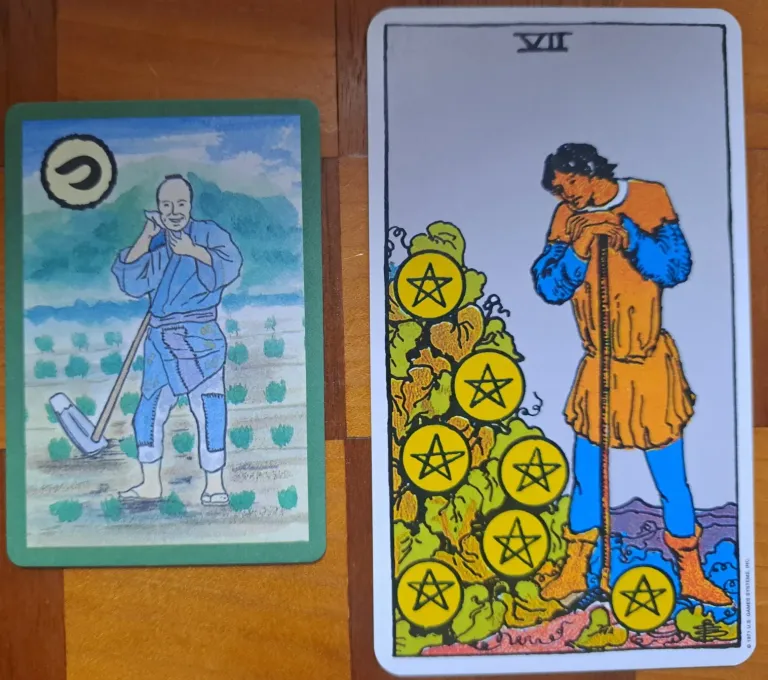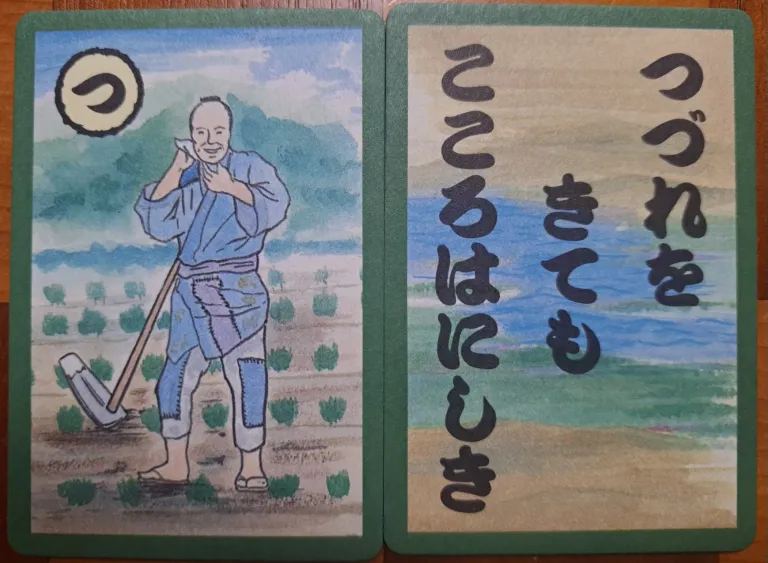Iroha Karuta 19a - Look beyond the appearance of things


The first thing that struck me when I looked at the illustration of the nineteenth syllable in one of my Iroha Karuta decks was its similarity to the Seven of Pentacles in the Rider Waite Tarot.
Well, okay there are some obvious differences as well. The farmer in the Seven of Pentacles, who I suppose is Italian, is leaning on a hoe and contemplating the progress of his vines while the Japanese farmer is cultivating some kind of root vegetable (white radish perhaps?) with a mattock, which he has propped against himself so that he can wipe the sweat from his neck.
On closer inspection, we might note that the sweaty Japaenese farmer is dressed in old patched clothes while the Italian chap looks quite well dressed and cool with an air of the poetic dreamer about him.
The 19th Syllable of the Iroha Syllabary
So what is the message of the nineteenth proverb in this particular version of the Iroha Karuta deck? The proverb illustrates the nineteenth syllable in the old Iroha kana syllabry, which is the syllable つ ("tsu"), and it goes like this:
つづれを着ても心は錦
Tsutzure o kitemo kokoro wa nishiki
Let's break it down:
Tsutzure = patched or worn-out clothes
o = object indicator ("patched clothes" is the object of the sentence here)
kite = put on / wear clothes, from the verb, "kiru" = to put on / to wear
mo = even if / even though
kokoro = heart, spirit, mind, the seat of a person’s moral and emotional being
wa = regarding (topic indicator)
nishiki = luxurious brocade fabric, often gold-embroidered silk, a symbol of wealth and prestige.
In other words,
Even though (you) wear patched clothes (your) heart is brocade.
Commentary
The commentary in the notebook that comes with this deck explains it like this:
ぼろをまとっていても、心は高価な厚い繊物をまとっている如く豊かである。
Boro o matotte ite mo, kokoro wa kōka na atsui senmono o matotte iru gotoku yutaka de aru.
It may be translated as,
Even if one is dressed in rags, the heart is as rich and splendid as if wrapped in thick, luxurious silk.
In other words, true beauty lies within. A person may be poor or modest in outward appearance, wearing worn, patched clothes (tsutzure), but if his heart is pure, kind, or noble, then he is more splendid than someone clothed in literal nishiki (brocade, luxurious silk). In short, inner dignity, character and kindness matter more than wealth or appearance.
My Translation
Given all that, here is my final translation of the proverb:
Tsutzure o kitemo / kokoro wa nishiki
Though his garments be tattered, his heart is clothed in brocade.
It was difficult to get close to the phonetic quality of this partiular proverb, I attempted to reproduce the "t" sounds in "tsutzure o kitemo" with the appropriate word "tattered" while the "ki" and "mo" are echoed in the word "garments." Beyond that, I was able to match the number of syllables in each half of the original proverb with the same number in each half of my translation.
ChatGPT versus Google Translate!
Okay, now let's put ChatGPT and Google Translate to the test...
ChatGPT:
Even if dressed in rags, the heart is brocade.
Not bad at all!
Google Translate:
Even if you wear a kimono, your heart is made of brocade
Oh dear, Google Translate messed up, so I reduced the proverb to the first clause and got this:
つづれを着て
wearing tapestries
Ha ha, that's even worse!
The clear winner is ChatGPT.
The Proverb and the Tarot
Going back to my comments about the similarities and differences between the illustrations of the Japanese proverb and the the Rider-Waite Seven of Pentacles, the Japanese proverb emphasizes a quality of "being," a person’s inner richness regardless of their outward appearance, while the tarot card emphasizes a quality "doing," the patient work that leads to future reward. One is about character, the other about sustained effort. Yet both images share a calm, grounded energy.
The japanese farmer has worked up a sweat and pauses to wipe his neck; his action in the illustration hints at the quality of his "being." On the other hand, the vinyard hand hasn't broken a sweat at all but seems to be deep in restful contemplation of what has been done and what is yet to be achieved. His restful state of being hints at the quality of his actions in the past and in the future. Both cards invite us to look beyond surface appearances, whether it’s patched clothing or a pause in progress, and recognize a deeper value of being or doing.
Cheers!
David Hurley
#InspiredFocus
For the best experience view this post on Liketu
Fascinating comparison of the two cards and the translations, David! I got an education! 😁 🙏 💚 ✨ 🤙
Thanks @tydynrain - I enjoy engaging with the various proverbs of these Japanese playing cards and it was fun to find one that could be compared with a tarot card.
!BBH
!ALIVE
Certainly, my friend, you're quite welcome. Wonderful, and that's what makes it so engaging, the interest and fun that you have with it. 😁 🙏 💚 ✨ 🤙
!ALIVE
!BBH